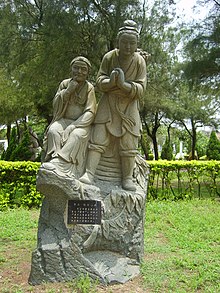Zengzi
[1] He later taught Zisi (Kong Ji), the grandson of Confucius, who was in turn the teacher of Mencius, thus beginning a line of transmitters of orthodox Confucian traditions.
[3] He was a native of South Wu City in the State of Lu, and was the son of Zeng Dian, one of the earliest disciples of Confucius.
He was noted for his filial piety, and after the death of his parents he could not read the rites of mourning without being led to think of them and being moved to tears.
His title, "Exhibitor of the Fundamental Principles of the Sage", dates from the reign of the Jiajing Emperor, when he was associated with Yan Hui.
[2] Zengzi established his own school, and taught Zisi (Kong Ji), the grandson of Confucius, who was in turn the teacher of Mencius, thus beginning a line of transmitters of orthodox Confucian traditions.
[2] A famous legend about Zeng Shen, called Nie Zhi Tong Xin (Chinese: 齧指痛心), is included in the influential Yuan dynasty text The Twenty-four Filial Exemplars.
When the neighbours told Zengzi's mom that “Zeng Shen” committed murder, she initially did not believe it and stayed calm as if nothing happened.
In 1452 the title Wujing Boshi (五經博士) was bestowed upon the descendants of Zengzi and other Confucian sages such as Mencius, Yan Hui, Zhou Dunyi, and Zhu Xi.

